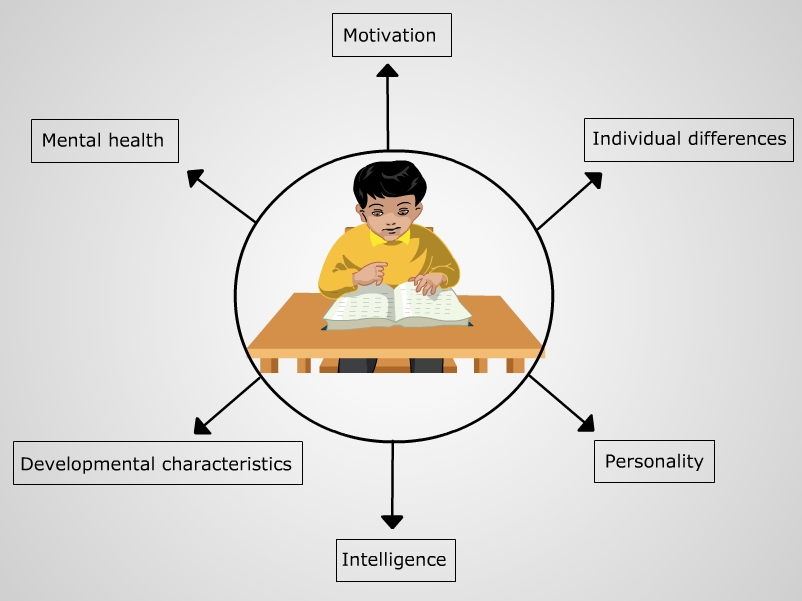1.2.1
After going through this session, you will be able to…
- Discuss the scope of educational psychology
Scope means the limits of
a particular subject in the field of its operation. What is to be included in
it or what subject matter does it contain, comes under its scope. Educational
psychology in particular, deals with the behaviour of the learner in an educational
situation. Therefore, it becomes imperative that educational psychology should
limit itself within the four walls of the teaching learning process and
educational environment. It must try and solve the problems evolving in actual
teaching-learning situations and help the individuals involved in this
process.
Select the correct option/s.
How dose educational psychology help in
improving the teaching-learning process? Please tick the correct options.
Knowing the learner
| |
Enabling the teacher to know her strengths and to acquire
essential teacher-like traits
| |
Selection and organization of proper
learning experiences suited to the individual and based on development stages of the
learner
| |
Suggesting suitable methods and techniques for
providing the desired learning experiences
| |
In arranging proper learning situation
| |
The scope of educational psychology may be discussed under the following heads:
The learner
Ajay and Vijay are classmates.
The geography teacher, Ms. Neeta taught them about Volcanoes, using the lecture method. She could not show
them an audio visual on the topic that particular day. In spite of that, Ajay understood
the concept but Vijay was unable to grasp it fully. The next day, Ms. Neeta showed them
a video on volcanoes. Vijay, then understood the concept very well.
Select the correct option/s.
1. Why do you think the teacher used a video along with the lecture method?
|
a. Teacher wanted her students to understand the concept
better.
| |
|
b. Teacher understood the need of her learners.
| |
|
c. Teacher wanted to grab the attention of the students.
|
2. Why is it that Ajay understood
the concept on the very first day but Vijay did not?
|
a. Ajay is more intelligent than Vijay.
| |
|
b. Vijay did not pay attention in class.
| |
|
c. Ajay is an auditory learner while Vijay prefers visual
learning.
|
Not only individual differences but other factors of the learner illustrated in the diagram below also come under the scope of educational psychology.

The
learning process
Learning is the process by which students acquire and retain attitudes, knowledge, understanding, skills and capabilities that cannot be attributed to inherited behavior patterns or physical growth. A number of theories have been put forward to explain how people learn. All of them have conceived of learning as a process that progresses in stages.
Visit the following link and read about
‘Learning Process’.
http://blog.iqmatrix.com/mind-map/accelerated-learning-mind-map
Select he correct option.
In which of the following cases, according to you, is learning taking place?
Maya is searching for information related to her project
work on the internet.
| |
Sachin is taking an online course on M.A. in
education.
| |
It is difficult to imagine any period of our lives, when learning is not happening. While walking down a street on any ordinary day, a person continually modifies his/her behavior in response to the environment. Thus, learning situations, covers all life experiences that modify our behavior. An effective learning situation is one in which all the essential elements for promoting learning; i.e., teacher, learner, subject matter, teaching materials and physical facilities, relevant to a particular situation, are presented in a dynamic relationship with one another. From the academic point of view learning situation refers to the classroom setting, which is composed of pupils, a teacher and a room. All have unique characteristics. In addition to these features, one also has to consider the behavior of teachers and pupils. Behavior includes not only overt physical activity such as talking and doing, but also cognitive processes like cognizing, thinking and evaluating. Educational psychology deals with the environmental factors and learning situations which come midway between the learner and the teacher.
The learning experience

Fig 2 : Passive Learning Fig 3 : Active Learning
How can you provide an enriching learning experience to students? Suggest some ways other than lecture method to improve students understanding of your subject.
Visit the Discussion Forum created for discussion on
the above topic. Post your reply in the forum.
After writing your post and reading others posts,
continue with the next module.
Designed and Developed by Department of Educational Technology, SNDT Women's University, Mumbai